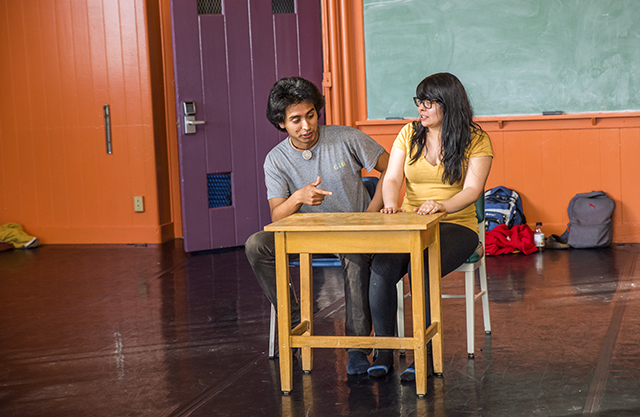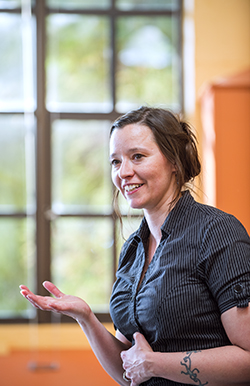For students enrolled in Humboldt State’s TA 307 class, also known as Theatre of the Oppressed, participation isn’t quite as threatening. In fact, the skills that evolved from Boal’s original concept can allow students to express themselves in non-confrontational ways that help them understand other perspectives.

“When you insert yourself into a scene, you are literally putting yourself in someone else’s shoes,” said Sarah Peters, who is teaching the class for the first time at HSU. “Stepping into the scenes opens your mind to realize that here are lots of different solutions or possibilities in any given struggle or conflict.”

A typical class session begins with student-led activities such as laughter yoga as a warm-up. Play-acting activities are up next, with this semester’s 27-student class breaking up into smaller groups to rehearse their scenes.
As the semester progresses, the groups will hone their rough drafts before presenting them as a final project, or even taking their skits into the community. The latter approach is known as invisible theatre, an activity that involves actors portraying roles in public and observing the reaction of spectators, who are unaware that the scene isn’t real.
During one recent class, a rough draft skit focused on an interaction between an aggressive man hitting on a passive woman, who struggles to find an appropriate response. Another, scripted by senior Theatre Arts major Jesse Chavez, followed a different format, portraying a mishandled sorority hazing incident on a college campus.
“I wanted to take this class because it teaches us how to make pieces that provoke thought, discussion and intense feelings, and that’s what I want to do as an artist,” Chavez said. “I don’t care about how dramatic or funny I can be onstage. If I can write or perform something in front of people and get them to feel something, anything, then I feel like I’ve done my job.”
Another method taught in the class is called forum theater. During the skit, audience members are invited to step in, take over a role, and potentially change the outcome.
“Forum theater allows audience members to say ‘stop’ and try different approaches to change the outcome,” says Peters, who also serves as school administrator at Dell’Arte International School of Physical Theatre in Blue Lake. “A fun term we use is ‘spect-actor.’ Involving the audience represents a fundamental belief that the ability to tell stories and act out what happened is something everyone has access to. We can all take this and act out the stories of our lives.”
Chavez, who is one of only seven Theatre Arts majors currently enrolled in the general education class, sees lasting benefits for students using theater as a means to address personal and societal issues.
“It’s a great way to give yourself a voice and speak the unspoken,” Chavez said. “For example, I’m writing a piece based on my personal experience with grief. I have a hard time discussing it with friends, but putting it to paper and hopefully to stage has helped me express what I couldn’t express at the time of my loss. Other students could take what they learn in this class and use it to voice an injustice they feel is being ignored. What we learn in this class is good for both our mental health and the health of whatever community we feel like we’re apart of.”